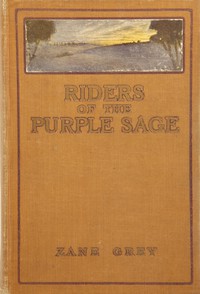The Desert of Wheat by Zane Grey (top 100 books to read .txt) 📖

- Author: Zane Grey
Book online «The Desert of Wheat by Zane Grey (top 100 books to read .txt) 📖». Author Zane Grey
Anderson's voice broke a little at this juncture and he paused. All was still except the murmur of the running water and the song of the insects. Presently Anderson cleared his throat and resumed:
"I saw five hundred Australian soldiers just arrived in New York by way of Panama. Lean, wiry boys like Arizona cowboys. Looked good to me! You ought to have heard the cheerin'. Roar an' roar, everywhere they marched along. I saw United States sailors, marines, soldiers, airmen, English officers, an' Scotch soldiers. Them last sure got my eye. Funny plaid skirts they wore—an' they had bare legs. Three I saw walked lame. An' all had medals. Some one said the Germans called these Scotch 'Ladies from hell.' … When I heard that I had to ask questions, an' I learned these queer-lookin' half-women-dressed fellows were simply hell with cold steel. An' after I heard that I looked again an' wondered why I hadn't seen it. I ought to know men!… Then I saw the outfit of Blue Devil Frenchmen that was sent over to help stimulate the Liberty Loan. An' when I seen them I took off my hat. I've knowed a heap of tough men an' bad men an' handy men an' fightin' men in my day, but I reckoned I never seen the like of the Blue Devils. I can't tell you why, boys. Blue Devils is another German name for a regiment of French soldiers. They had it on the Scotch-men. Any Western man, just to look at them, would think of Wild Bill an' Billy the Kid an' Geronimo an' Custer, an' see that mebbe the whole four mixed in one might have made a Blue Devil.
"My young friend Dorn, that's dyin' up-stairs, now—he had a name given him. 'Pears that this war-time is like the old days when we used to hit on right pert names for everybody.… Demon Dorn they called him, an' he got that handle before he ever reached France. The boys of his outfit gave it to him because of the way he run wild with a bayonet. I don't want my girl Lenore ever to know that.
"A soldier named Owens told me a lot. He was the corporal of Dorn's outfit, a sort of foreman, I reckon. Anyway, he saw Dorn every day of the months they were in the service, an' the shell that done Dorn made a cripple of Owens. This fellow Owens said Dorn had not got so close to his bunk-mates until they reached France. Then he begun to have influence over them. Owens didn't know how he did it—in fact, never knew it at all until the outfit got to the front, somewhere in northern France, in the first line. They were days in the first line, close up to the Germans, watchin' an' sneakin' all the time, shootin' an' dodgin', but they never had but one real fight.
"That was when one mornin' the Germans came pilin' over on a charge, far outnumberin' our boys. Then it happened. Lord! I wish I could remember how Owens told that scrap! Boys, you never heard about a real scrap. It takes war like this to make men fighters.… Listen, now, an' I'll tell you some of the things that come off durin' this German charge. I'll tell them just as they come to mind. There was a boy named Griggs who ran the German barrage—an' that's a gantlet—seven times to fetch ammunition to his pards. Another boy, on the same errand, was twice blown off the road by explodin' shells, an' then went back. Owens told of two of his company who rushed a bunch of Germans, killed eight of them, an' captured their machine-gun. Before that German charge a big shell came over an' kicked up a hill of mud. Next day the Americans found their sentinel buried in mud, dead at his post, with his bayonet presented.
"Owens was shot just as he jumped up with his pards to meet the chargin' Germans. He fell an' dragged himself against a wall of bags, where he lay watchin' the fight. An' it so happened that he faced Dorn's squad, which was attacked by three times their number. He saw Dorn shot—go down, an' thought he was done—but no! Dorn came up with one side of his face all blood. Dixon, a college football man, rushed a German who was about to throw a bomb. Dixon got him, an' got the bomb, too, when it went off. Little Rogers, an Irish boy, mixed it with three Germans, an' killed one before he was bayoneted in the back. Then Dorn, like the demon they'd named him, went on the stampede. He had a different way with a bayonet, so Owens claimed. An' Dorn was heavy, powerful, an' fast. He lifted an' slung those two Germans, one after another, quick as that!—like you'd toss a couple of wheat sheafs with your pitchfork, an' he sent them rollin', with blood squirtin' all over. An' then four more Germans were shootin' at him. Right into their teeth Dorn run—laughin' wild an' terrible, Owens said, an' the Germans couldn't stop that flashin' bayonet. Dorn ripped them all open, an' before they'd stopped floppin' he was on the bunch that'd killed Brewer an' were makin' it hard for his other pards.… Whew!—Owens told it all as if it'd took lots of time, but that fight was like lightnin' an' I can't remember how it was. Only Demon Dorn laid out nine Germans before they retreated. Nine! Owens seen him do it, like a mad bull loose. Then the shell came over that put Dorn out, an' Owens, too.
"Well, Dorn had a mangled arm, an' many wounds. They amputated his arm in France, patched him up, an' sent him back to New York with a lot of other wounded soldiers. They expected him to die long ago. But he hangs on. He's full of lead now. What a hell of a lot of killin' some men take!… My boy Jim would have been like that!





Comments (0)